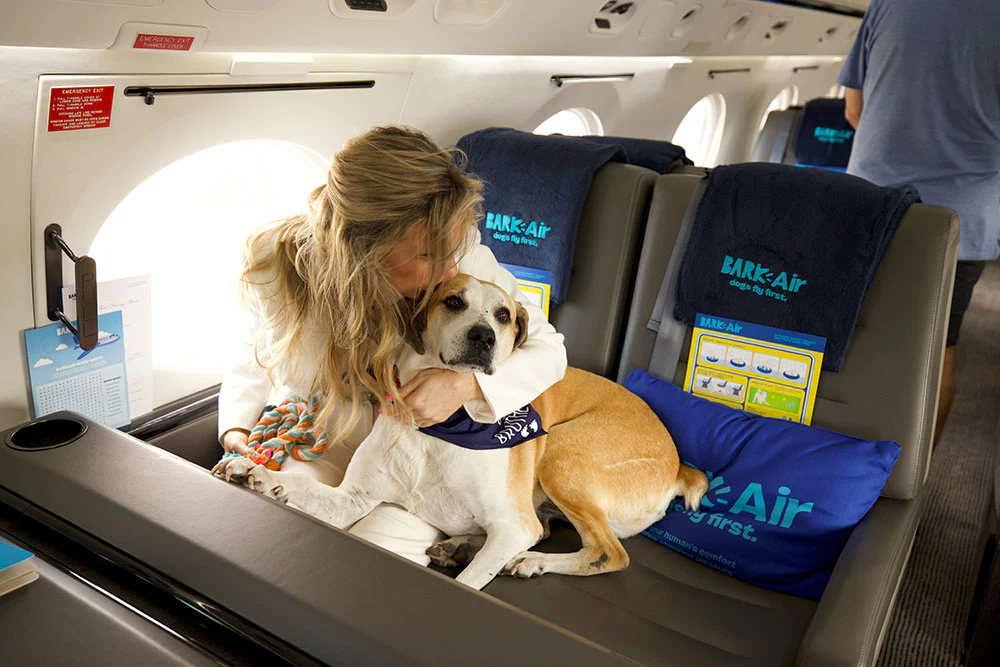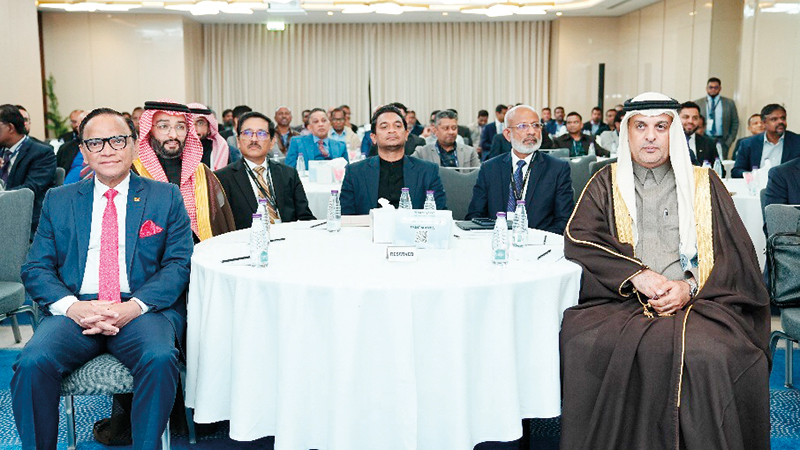Business
‘BARK Air’ the world’s first doggy jet service will take off on May 23

Dogs will soon be able to experience their own “furst” class flight with the launch of the world’s first jet charter company specifically designed for man’s best friend on 23rd May.
BARK, the dog toy company that coordinates the popular treat subscription BarkBox, is partnering with a jet charter service to take away the challenges of long-distance traveling with dogs, according to a press release. BARK Air, as the company calls it, offers the “white glove experience typical of a human’s first-class experience and redirected all that pampering to pooches.”
Taking dogs on airplanes is, typically, a stressful endeavor with different airlines having different policies for pet travel. For example, American Airlines allows small dogs in a carrier to be placed under the seat in front, but larger dogs are put in the cargo space, which has been found to be stressful for the pet. For United Airlines, pets can fly in the cabin if there’s enough space, but they must fit in a carrier under the seat in front.

“Dogs Fly First”(pic BARK Air)
“We are excited to take the insights we’ve learned over years to create an experience that is truly dog-first, which is drastically different from just accepting dogs – from the ground to the skies,” said Matt Meeker, Co-Founder and Chief Executive Officer at BARK, in a statement.
However, you’ll need to pay a hefty fee for the dog-friendly flight. For now, a ticket for just one dog and one human will run you at least $6,000 one way.
The first BARK Air flights will take off on May 23, and so far, there are only two flight routes available, both from New York’s Westchester County Airport. From New York to London’s Stansted Airport, it’ll cost $8,000 one-way and to Los Angeles’s Van Nuys Airport will cost $6,000 one-way.
Business
A Historic First: Sri Lanka’s capital market leaders bring investor forum to Saudi Arabia

The Securities and Exchange Commission of Sri Lanka (SEC) and the Colombo Stock Exchange (CSE), in association with the Embassy of Sri Lanka to the Kingdom of Saudi Arabia, successfully convened an investor forum on Saturday 24th January 2026 at the Radisson Blu Hotel, Riyadh Convention & Exhibition Center. Alongside the forum, the SEC and CSE facilitated a meeting with the Public Investment Fund (PIF) which is Saudi Arabia’s main sovereign wealth fund.
The forum was organized to engage directly with the vibrant Sri Lankan expatriate community in the Kingdom and international investors, highlighting compelling opportunities within Sri Lanka’s capital market following the country’s successful exit from sovereign default and restoration of macroeconomic stability.
The forum was marked by the presence of several senior level policy officials, market leaders and market regulators including; Dr. P. Nandalal Weerasinghe, Governor of the Central Bank of Sri Lanka (CBSL); Chathuranga Abeysinghe, Deputy Minister of Industry and Entrepreneurship Development; Ameer Ajwad Ambassador of Sri Lanka to the Kingdom of Saudi Arabia.; Senior Prof D.B.P.H. Dissabandara, Chairman of the SEC; Ray Abeywardena, Director of CSE; and Dr. Naveen Gunawardane, Co-Founder and Managing Director of Lynear Wealth Management.
In his welcome address, Ameer Ajwad stated, that a significant opportunity remains in broadening public participation in the capital market of Sri Lanka. As financial literacy and investment awareness among potential investors are limited, the investor forum would serve to bridge the knowledge gap. The forum offered an excellent opportunity for first-time investors, overseas investors, and those seeking to enhance their knowledge, to learn how to invest prudently, manage risk, and build wealth with discipline and confidence. Ambassador invited participants to make full use of the presence of high-level authorities from Sri Lanka’s key financial institutions, such as the Central Bank of Sri Lanka, the SEC, and the CSE, and to explore investment opportunities in Sri Lanka’s capital market, not only as a pathway to financial growth but also as a meaningful contribution to Sri Lanka’s resilience and long-term prosperity.
Business
CIC Holdings’ 9MFY26 revenue reaches Rs.70 bn

Agriculture-rich diversified conglomerate CIC Holdings PLC (CSE: CIC) recorded a consolidated revenue of Rs. 70.28 billion for the nine months ended 31 December 2025 (9MFY26), reflecting an increase of 8.69% YoY compared to the corresponding period of the previous year.
The Group’s gross profit increased by 10.11% to Rs. 18.42 billion, with the gross profit margin for the period under review improving to approximately 26%, supported by disciplined pricing and product mix optimisation. Profit after tax (PAT) increased to Rs. 5.97 billion from Rs. 5.70 billion in the corresponding period of the previous year, despite losses incurred in parts of the Group’s agri operations following the impact of Cyclone Ditwah, which disrupted cultivation activity during the Maha season.
The Group’s Crop Solutions sector remained the largest contributor to consolidated revenue, accounting for approximately 44.7% of total revenue, followed by Livestock Solutions at 21% and Health & Personal Care at 20.18%. The remaining sectors, Industrial Solutions and Agri Produce, contributed 8.6% and 6.4% to Group turnover respectively. Health and Personal Care , particularly export-driven product lines, recorded improved performance during the period, alongside continued growth in feeds, poultry, and veterinary care solutions, which supported the Group’s overall operating results.
Despite cyclone-related disruption to cultivation cycles, the Group delivered a strong operating performance, with EBITDA and operating profit (EBIT) both recording year-on-year growth. Operating profit (EBIT) closed at Rs. 9.67 billion, compared to Rs. 8.62 billion in the corresponding period of the previous year, reflecting the strength of the Group’s diversified portfolio and disciplined cost management.
During the period in review, key Group businesses across the five industry sectors, namely Crop Solutions, Agri Produce, Livestock Solutions, Industrial Solutions, and Health & Personal Care, continued to perform resiliently. Crop Solutions revenue increased from Rs. 28.06 billion to Rs. 32.32 billion, while Livestock Solutions revenue grew from Rs. 13.35 billion to Rs. 14.60 billion. Health & Personal Care revenue improved from Rs. 14.29 billion to Rs. 14.46 billion, supported by herbal health product exports and steady domestic demand. Revenue from Agri Produce increased from Rs. 4.35 billion to Rs. 4.64 billion, while Industrial Solutions revenue rose from Rs. 6.07 billion to Rs. 6.28 billion.
Commenting on the performance, CIC Holdings Group CEO Aroshan Seresinhe said, “Despite the disruption caused by Cyclone Ditwah to agricultural activity during the Maha season, the Group remained focused on supporting farming communities through well clean-up operations, field renovation, and the restoration of cultivation activity.
Business
CSE regains some of its bullish verve as turnover hits Rs.11 billion

CSE trading reflected a bullish trend yesterday due to positive quarterly corporate earnings coupled with lower Treasury Bill yields, market analysts said.
Further, institutional participation contributed more than 50 percent to the day’s turnover.
Amid those developments both indices moved upwards. The All Share Price Index went up by 63.67 points, while the S and P SL20 rose by 12.58 points.
Turnover stood at Rs 11.1 billion with10 crossings. The top seven crossings were: JKH 189.5 million shares crossed to the tune of Rs 4.2 billion; its shares traded at Rs 22.70, HNB 3.5 million shares crossed for Rs 1.48 billion; its shares traded at Rs 422, Hemas Holdings 11 million shares crossed for Rs 376.2 million; its shares traded at Rs 34 20, Commercial Bank 1.5 million shares crossed for Rs 336.8 million; its shares traded at Rs 224.50, Sampath Bank 600,000 shares crossed for Rs 93.6 million; its shares sold at Rs 156, Laugfs Gas 868,000 shares crossed for Rs 51.6 million; its shares sold at Rs 71 and Sierra Cables 1 million shares crossed for Rs 36.7 million; its shares sold at Rs 36.70.
In the retail market top seven companies that mainly contributed to the turnover were; Ceylon Land Equity Rs 385 million (20 million shares traded), Commercial Bank Rs 373.9 million (1.7 million shares traded), Luminex Rs 247.2 million (26.7 million shares traded), Colombo Dockyard Rs 152 million (one million shares traded), TJ Lanka Rs 152 million (four million shares traded), Easter Merchants Rs 142 million (8.7 million shares traded) and RIL Properties Rs 116.9 million. During the day 441.3 million share volumes changed hands in 44406 transactions.
It is said that manufacturing sector counters, especially JKH, led the market while the banking sector also performed well, especially HNB and Sampath Bank. Further, the capital goods sector too performed well.Yesterday the Central Bank’s US dollar buying rate was Rs 305.78 and selling rate Rs 313.32.
By Hiran H Senewiratne
-

 Business6 days ago
Business6 days agoHayleys Mobility ushering in a new era of premium sustainable mobility
-

 Business3 days ago
Business3 days agoSLIM-Kantar People’s Awards 2026 to recognise Sri Lanka’s most trusted brands and personalities
-

 Business6 days ago
Business6 days agoAdvice Lab unveils new 13,000+ sqft office, marking major expansion in financial services BPO to Australia
-

 Business6 days ago
Business6 days agoArpico NextGen Mattress gains recognition for innovation
-

 Business5 days ago
Business5 days agoAltair issues over 100+ title deeds post ownership change
-

 Editorial6 days ago
Editorial6 days agoGovt. provoking TUs
-

 Business5 days ago
Business5 days agoSri Lanka opens first country pavilion at London exhibition
-

 Business4 days ago
Business4 days agoAll set for Global Synergy Awards 2026 at Waters Edge













